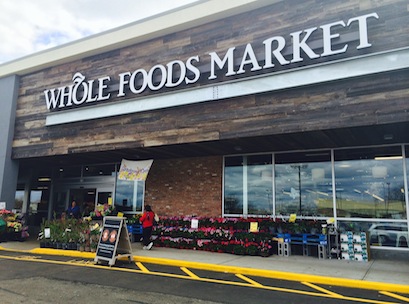 Amazon.com says it plans to complete its US$13.7 billion (A$17.3 billion) acquisition of Whole Foods Market on Monday after winning antitrust approval from US regulators.
Amazon.com says it plans to complete its US$13.7 billion (A$17.3 billion) acquisition of Whole Foods Market on Monday after winning antitrust approval from US regulators.
The companies said in a joint statement that Whole Foods will offer lower prices starting on Monday “on a selection of best-selling grocery staples across its stores”.
Amazon also said that it will start selling Whole Foods brand products on its website.
Amazon said Whole Foods Market will operate as a subsidiary and John Mackey will remain as CEO and Whole Foods Market’s headquarters will remain in Austin, Texas
Some grocery store stocks fell after the news. Kroger was down 4.6 per cent. Walmart Stores was down 2.1 per cent.
Amazon said starting Monday, it will cut prices on Whole Trade bananas, organic avocados, organic large brown eggs, organic farmed salmon and tilapia, organic baby kale and baby lettuce, some apples, butter, and other products.
Amazon said its Prime members will eventually become part of Whole Foods Market’s customer rewards program.
The shareholder-approved Amazon-Wholefoods deal gives the company a sizeable bricks-and-mortar presence in food retail with the ability to revolutionise online grocery shopping, and leading retailers are well aware that they are under threat, according to GlobalData senior analyst Molly Johnson-Jones, who pointed to global retail developments including Walmart partnering with Google Ocado; Aldi who might be the first online Food & Grocery discounter;and same-day delivery being commonplace.
“These developments will shape the evolution of grocery retail,” she said.
“The level of disruption and disarray that Amazon will bring to the market usually evokes panic from the incumbent grocers. Look at the UK big four, for example, who panicked and cut prices across every range in an effort to protect against the discounters, but it didn’t work; it just sabotaged margins. Only now have they created a strategy to differentiate themselves from the discounters and fight on price with directly overlapping ranges.”
Meanwhile, an Amazon-backed US home security startup is aiming to capitalise on the growing number of people renting in Australia, as the ‘internet of things’ market climbs globally.
Scout Security, a home security provider that allows owners or a professional to monitor homes 24/7 via a smartphone app, will list on the ASX on Friday after raising $US5 million ($A6.5 million) in an initial public offering (IPO) with an issue price of 20 cents.
Scout first caught Amazon’s eye as a successful vendor on the online platform in 2015, selling the alarms which send mobile notifications and sound a siren when an intrusion is detected by sensors in the home.
Soon after, the US-based company received $US250,000 in backing through Amazon’s Alexa fund.
The online retail giant will have a 2.6 per cent stake in Scout, post-listing.
Scout co-founder Dan Roberts says the product’s major attraction to a younger audience is that it is transferable between properties, with no long-term commitment.
“It really opens up the market to those that have been priced out or whose living situation is such that they can’t do a contract,” he told AAP.
Roberts started the business after noting security systems in the US market were either too expensive or burdened with long-term contract conditions.
“I couldn’t believe that the only options from the traditional providers utilised 1980’s technology, had three to five year contracts and $US60 to $US70 in monthly fees,” he said.
Scout’s focus on young renters could be justified given statistics from Australia’s 2016 Census which found nearly 31 per cent of Australians now pay a landlord, up from just under 30 per cent five years ago and 27 per cent in 1991.
Scout, which also connects with smart home products such as Amazon’s Alexa, Google Nest and Samsung SmartThings, turned over $US1.9 million in gross revenue in 2016.
But the company has warned investors, if a larger, better funded company markets a comparable product at a lower price point, Scout may have to reduce prices to remain competitive or could be priced out of the Australian market.
Access exclusive analysis, locked news and reports with Inside Retail Weekly. Subscribe today and get our premium print publication delivered to your door every week.





